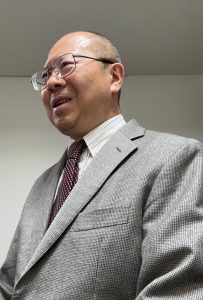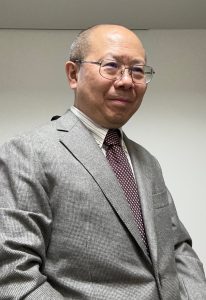

Prof. KUMAGAI, Takashi
Ph. D. (Science)
Mathematics is the foundation of all natural sciences.
By expressing the myriad phenomena of the universe through mathematics, it becomes possible to solve fundamental problems. This leads to the ‘pursuit of truth.’
In the Department of Mathematics, we cultivate advanced mathematical sensibilities not only in pure mathematics but also for scientifically explaining and theorizing various natural and social phenomena.
The Department of Mathematics in Waseda University, established in 1949, is a historically significant department. In the Department of Mathematics, education and research are conducted focusing on four main areas: algebra, geometry, analysis, and applied mathematics.
Since the Department of Mathematics is part of the School of Fundamental Science and Engineering, prospective students who wish to study in the Department of Mathematics must first take the entrance examination for the School of Fundamental Science and Engineering.
In the first year, students take common subjects in science and engineering as well as subjects in the humanities and social sciences. At the same time, they also take common courses aimed at providing an overview of mathematics, applied mathematics, and information science. Upon advancing to the second year and being assigned to the Department of Mathematics, students take foundational courses necessary to understand modern mathematics as compulsory subjects, acquiring the basic skills to advance in any field. From the third year, students can choose specialized courses according to their aptitudes and interests. In the latter half of the third year, students can take a pre-seminar called ‘Special Mathematics Exercises’ to experience studying in a laboratory. At the beginning of the fourth year, students are officially assigned to a laboratory and, under the guidance of their supervisor, they engage in specialized study in various research fields through small seminar-style classes called ‘Special Seminar on Mathematics’.
The Department of Mathematics works closely with the Department of Applied Mathematics, allowing students to take courses offered by the Department of Applied Mathematics. This enables students to develop mathematical abilities that integrate pure mathematics with various fields of science and engineering.
Mathematics is a discipline that has walked alongside human history, possessing unparalleled universality and broad applicability. In fact, once theories in mathematics are proven and verified, they become universal theories, and a recognized theory is never later refuted by the emergence of newer theories, making it one of the most reliable fields of study. If you discover, prove, and publish a new mathematical truth, it will be recognized and disseminated worldwide.
In the Department of Mathematics, as previously mentioned, we focus on the four pillars of algebra, geometry, analysis, and applied mathematics. Our educational goal is not just to teach techniques, but to nurture students with mathematical thinking skills capable of discerning the fundamental structures of things and conducting analyses. Through small-group education, we aim to hone problem-solving skills and comprehensive judgment, cultivating individuals who can excel in various scientific fields and academic areas, and contribute to the international community.
Mathematical thinking skills develop gradually while studying in the Department of Mathematics, though there are individual differences. People who enjoy thinking about mathematics and are interested in the fundamental structures of things are well-suited for the Department of Mathematics. We definitely want such students to join our department.
My specialty is probability theory. Using tools from probability theory, I conduct research aimed at understanding physical properties such as heat conduction on ‘disordered media’ such as fractals and probabilistic models that appear in statistical mechanics. Specifically, I consider random walks or Brownian motions on disordered media such as fractals to analyze properties like heat conduction. Due to the lack of smoothness on fractals, classical notion of differentiation do not apply, but probabilistic methods remain effective in such spaces, so they are well suited to exploring physical phenomena in these disordered media.
The study using probability theory also allows for a visual and intuitive grasp of the meanings of abstract equations by analyzing the movements of random particles. In practice, this theme intertwines closely with various research fields including harmonic analysis, functional spaces, global analysis, and geometric analysis, highlighting the interdisciplinary nature of research.
On disordered media, heat conduction exhibits anomalous diffusion phenomena which are different from the heat conduction on ordinary spaces (Euclidean spaces). Over the past 35 years, significant progress has been made in understanding the mathematical mechanisms behind anomalous diffusion phenomena, and currently, applications to models appearing in statistical mechanics are advancing.
Actual research often involves many unsuccessful approaches, but the excitement I feel when I find a good method and am able to see the mathematical structure behind a phenomenon is something that can not be replaced by anything else. To put it in perspective, it is like climbing a mountain. You climb up a mountain, sweating, and then at the end you see an amazingly beautiful view and you are really moved. It is similar to that feeling.

We are currently in the midst of the Fourth Industrial Revolution, where technological innovations such as AI and Big Data analysis are rapidly advancing. Mathematical thinking lies at the heart of these innovations and there is also a growing demand in society. To develop mathematical thinking, it is crucial to cultivate a spirit of self-study —investigating, pondering, and deepening one’s understanding independently— as well as expanding one’s horizons through discussions with friends and teachers.
Some of you may have concerns like, ‘Will majoring in mathematics ensure a future career path?’ Such worries are unnecessary. Mathematical thinking, which involves delving into the fundamentals of phenomena and considering universal properties, will only become more essential in the future. For prospective students and current students interested in mathematics, let’s learn together in the Department of Mathematics!